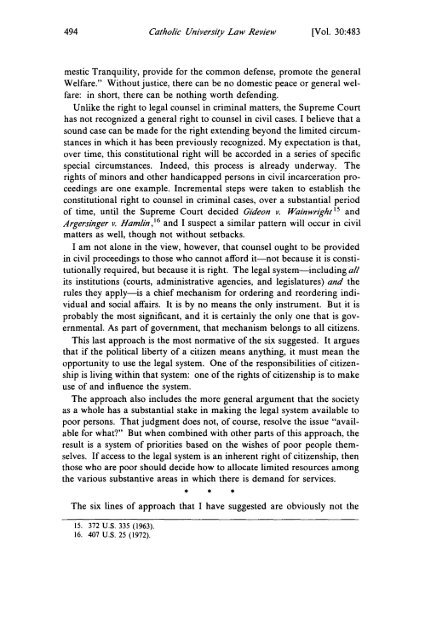Law for The Poor
Law for The Poor
Law for The Poor
You also want an ePaper? Increase the reach of your titles
YUMPU automatically turns print PDFs into web optimized ePapers that Google loves.
Catholic University <strong>Law</strong> Review<br />
[Vol. 30:483<br />
mestic Tranquility, provide <strong>for</strong> the common defense, promote the general<br />
Welfare." Without justice, there can be no domestic peace or general welfare:<br />
in short, there can be nothing worth defending.<br />
Unlike the right to legal counsel in criminal matters, the Supreme Court<br />
has not recognized a general right to counsel in civil cases. I believe that a<br />
sound case can be made <strong>for</strong> the right extending beyond the limited circumstances<br />
in which it has been previously recognized. My expectation is that,<br />
over time, this constitutional right will be accorded in a series of specific<br />
special circumstances. Indeed, this process is already underway. <strong>The</strong><br />
rights of minors and other handicapped persons in civil incarceration proceedings<br />
are one example. Incremental steps were taken to establish the<br />
constitutional right to counsel in criminal cases, over a substantial period<br />
of time, until the Supreme Court decided Gideon v. Wainwright' 5 and<br />
Argersinger v. Hamlin,' 6 and I suspect a similar pattern will occur in civil<br />
matters as well, though not without setbacks.<br />
I am not alone in the view, however, that counsel ought to be provided<br />
in civil proceedings to those who cannot af<strong>for</strong>d it-not because it is constitutionally<br />
required, but because it is right. <strong>The</strong> legal system-including a/<br />
its institutions (courts, administrative agencies, and legislatures) and the<br />
rules they apply-is a chief mechanism <strong>for</strong> ordering and reordering individual<br />
and social affairs. It is by no means the only instrument. But it is<br />
probably the most significant, and it is certainly the only one that is governmental.<br />
As part of government, that mechanism belongs to all citizens.<br />
This last approach is the most normative of the six suggested. It argues<br />
that if the political liberty of a citizen means anything, it must mean the<br />
opportunity to use the legal system. One of the responsibilities of citizenship<br />
is living within that system: one of the rights of citizenship is to make<br />
use of and influence the system.<br />
<strong>The</strong> approach also includes the more general argument that the society<br />
as a whole has a substantial stake in making the legal system available to<br />
poor persons. That judgment does not, of course, resolve the issue "available<br />
<strong>for</strong> what?" But when combined with other parts of this approach, the<br />
result is a system of priorities based on the wishes of poor people themselves.<br />
If access to the legal system is an inherent right of citizenship, then<br />
those who are poor should decide how to allocate limited resources among<br />
the various substantive areas in which there is demand <strong>for</strong> services.<br />
<strong>The</strong> six lines of approach that I have suggested are obviously not the<br />
15. 372 U.S. 335 (1963).<br />
16. 407 U.S. 25 (1972).

















